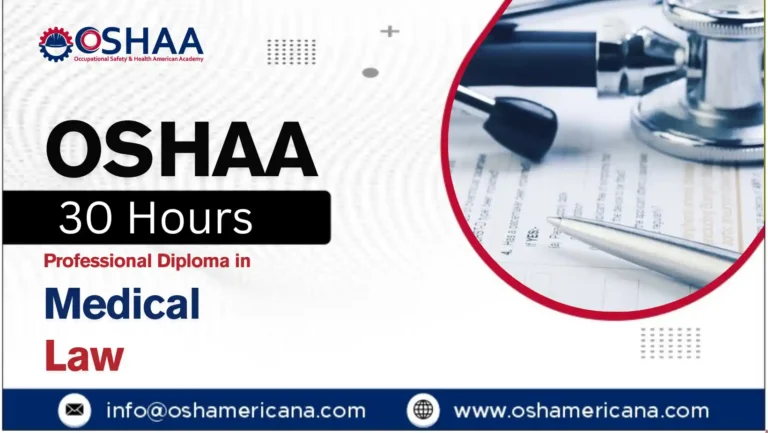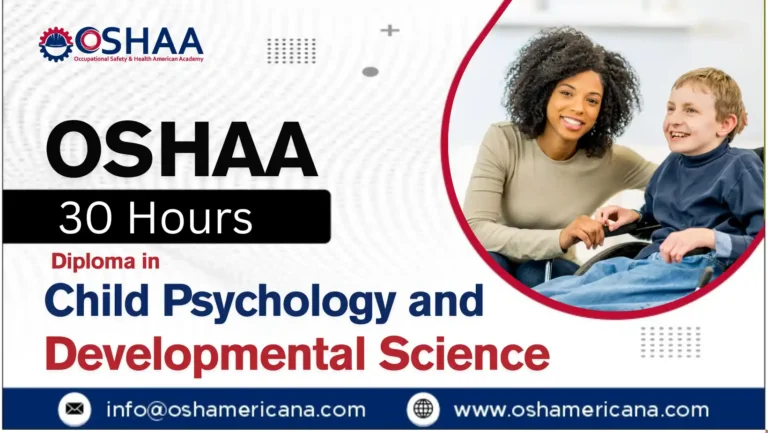Attention Deficit Hyperactivity Disorder (ADHD) is a condition that affects millions of people worldwide. Characterized by symptoms such as inattention, hyperactivity, and impulsiveness, ADHD can significantly impact a person’s life, affecting their academic, social, and professional experiences. The OSHAA 30-Hours Diploma in the Symptoms, Treatment, and Management of ADHD provides a thorough understanding of ADHD, equipping professionals with the knowledge and skills necessary to support individuals living with the disorder.
The OSHAA 30-Hours Diploma in the Symptoms, Treatment, and Management of ADHD is a specialized qualification designed to provide a comprehensive understanding of ADHD. This course covers various aspects of the disorder, including its symptoms, diagnostic processes, treatment options, and effective management strategies. It is aimed at healthcare professionals, educators, and those involved in the care of individuals with ADHD.
The OSHAA 30-Hours Diploma in the Symptoms, Treatment, and Management of ADHD offers an in-depth, comprehensive approach to understanding and managing ADHD. With practical knowledge of the disorder’s impact and treatment options, this diploma helps professionals provide the best support to those affected by ADHD. Whether you’re a healthcare provider, educator, or caregiver, the course will provide you with the skills to make a meaningful difference in the lives of individuals with ADHD.
ADHD is a complex and often misunderstood condition, but with the right knowledge and skills, professionals can make a significant impact on the lives of those affected. The OSHAA 30-Hours Diploma in the Symptoms, Treatment, and Management of ADHD offers a thorough and accessible learning experience, equipping participants with the expertise required to effectively diagnose, treat, and manage ADHD in various settings.
OSHAA 30-Hours Diploma in the Symptoms, Treatment and Management of ADHD
Study Units
Learning Outcomes
Introduction to ADHD: Symptoms and Causes (2 hours)
- Understand the core symptoms of ADHD, including inattention, hyperactivity, and impulsivity
- Explore the potential causes of ADHD, including genetic, neurological, and environmental factors
- Recognise the impact of ADHD on an individual’s personal, academic, and social life
Diagnostic Criteria and Assessment Tools for ADHD (4 hours)
- Learn the diagnostic criteria for ADHD based on DSM-5 guidelines
- Understand the role of assessment tools such as behaviour checklists and psychological evaluations in diagnosing ADHD
- Gain knowledge of how ADHD is differentiated from other conditions with similar symptoms
Pharmacological Treatment Options for ADHD (5 hours)
- Understand the different types of medications used to treat ADHD, including stimulants and non-stimulants
- Learn about the effects, benefits, and potential side effects of ADHD medications
- Gain insight into the process of medication management and monitoring in ADHD treatment
Non-Pharmacological Treatments and Therapies (4 hours)
- Learn about behavioural therapy, cognitive-behavioural therapy (CBT), and other non-drug treatments for ADHD
- Understand the role of environmental modifications and structured routines in managing ADHD symptoms
- Explore alternative therapies and approaches for individuals who prefer or require non-pharmacological treatment
ADHD Management in Children (4 hours)
- Understand the specific challenges of managing ADHD in children and the importance of early intervention
- Learn strategies for supporting children with ADHD in educational settings
- Gain insight into parenting techniques and behavioural management approaches tailored to children with ADHD
ADHD Management in Adults (3 hours)
- Recognise the unique challenges faced by adults with ADHD and the impact on their work and daily life
- Learn strategies for managing ADHD symptoms in adulthood, including organisation, time management, and emotional regulation
- Explore accommodations in the workplace and strategies for improving adult functioning
Co-occurring Conditions with ADHD (3 hours)
- Understand the common co-occurring conditions associated with ADHD, such as anxiety, depression, and learning disabilities
- Learn how to recognise and manage these co-occurring conditions in individuals with ADHD
- Gain skills in providing integrated care for individuals with ADHD and co-occurring disorders
Supporting Families and Caregivers of Individuals with ADHD (3 hours)
- Learn about the emotional, financial, and social challenges faced by families and caregivers of individuals with ADHD
- Develop strategies for providing support to families and caregivers in coping with the demands of ADHD management
- Understand the importance of education and guidance for families to improve outcomes for individuals with ADHD
Strategies for Promoting Self-Management and Coping Skills (2 hours)
- Learn techniques to help individuals with ADHD develop self-management skills and coping strategies
- Understand how to promote independence and self-advocacy in individuals with ADHD
- Gain skills in teaching practical tools for time management, organization, and emotional regulation
- Comprehensive Knowledge of ADHD: Gain a thorough understanding of ADHD, including its symptoms, causes, diagnosis, and treatment options, enabling you to effectively support individuals with ADHD.
- Evidence-Based Treatment Strategies: Learn about both pharmacological and non-pharmacological treatments, giving you a broad range of tools to manage ADHD symptoms in children, adults, and families.
- Specialisation in ADHD Management: Specialise in ADHD management, making you a valuable asset in healthcare, educational, and social support settings where ADHD care is required.
- Practical Skills for Immediate Application: Develop practical strategies for managing ADHD, such as behavioural techniques, coping strategies, and organisational skills, which can be immediately applied in your professional or personal life.
- Career Advancement: Enhance your professional credentials and increase your employability by gaining a recognised qualification in ADHD management.
- Improved Client Outcomes: With knowledge of the latest treatment methods and support strategies, you’ll be equipped to help improve the quality of life for individuals with ADHD, whether they are children, adults, or families.
- Flexible Learning: The 30-hour course allows you to study at your own pace, making it suitable for professionals with varying schedules.
- Support for Families and Caregivers: Understand the challenges faced by caregivers and families, and learn how to provide crucial support, offering a holistic approach to ADHD care.
- Better Understanding of Co-occurring Conditions: Learn how to recognise and manage co-occurring conditions like anxiety and depression, which are often seen in individuals with ADHD, allowing for integrated care.
- Industry Recognition: This diploma is recognised in the healthcare and educational sectors, increasing your qualifications and potential career opportunities in a growing field.
This course provides the knowledge and skills needed to make a meaningful difference in the lives of individuals with ADHD, offering both professional and personal development opportunities.
The OSHAA 30-Hours Diploma in the Symptoms, Treatment, and Management of ADHD is designed for professionals and individuals looking to deepen their understanding of Attention Deficit Hyperactivity Disorder (ADHD) and gain practical skills to support individuals affected by the condition.
- Healthcare professionals such as doctors, nurses, psychologists, and mental health specialists who wish to enhance their expertise in ADHD diagnosis and treatment
- Teachers, educational support staff, and school counsellors who work with students with ADHD and need strategies for classroom management and academic support
- Social workers, therapists, and counsellors who provide care to individuals with ADHD or related conditions
- Parents, caregivers, and family members of individuals with ADHD who want to better understand the condition and learn effective support techniques
- HR professionals and managers who work with employees with ADHD, helping to create supportive workplace environments
- Anyone looking to pursue a career in ADHD management or seeking to specialise in this area of healthcare, education, or social support







